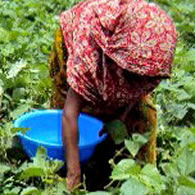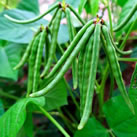Ethical Organic Mung Bean Farms Guide: Sustainable Legumes & Consumer Tips
- David Burgess
- Nov 25, 2024
- 8 min read
Key Takeaways
Ethical organic mung bean farms prioritize sustainable farming practices that benefit the environment, farmers, and consumers.
Mung beans are a nutrient-dense legume that serves as a sustainable alternative to animal proteins.
Organic farming techniques for mung beans include crop rotation, composting, and natural pest management.
Supporting ethical mung bean farms can be done by purchasing organic, locally sourced products and participating in community-supported agriculture programs.
Integrating mung beans into your diet is easy, offering versatile culinary options from soups to plant-based egg alternatives.

"Sustainable Mung Bean Farming System ..." from www.csrwire.com
Lotus Ministry Supports Local Bangladeshi Farmers
The Rise of Ethical Organic Mung Bean Farming
The agricultural landscape is evolving, and ethical organic mung bean farms are at the forefront of this transformation. These farms are not just about growing beans; they represent a commitment to sustainable agriculture that respects the planet and its people. By adopting organic farming methods, these farms minimize environmental impact while producing high-quality, nutritious food.
But why mung beans? Besides their nutritional benefits, mung beans are an excellent choice for sustainable farming. They require less water and fertilization compared to many other crops, making them an environmentally friendly option. This is particularly important as water scarcity and soil degradation continue to challenge global agriculture.
What Are Ethical Organic Mung Bean Farms?
Ethical organic mung bean farms focus on sustainable practices that prioritize the health of the soil, the well-being of farmers, and the quality of the produce. These farms use organic methods to cultivate mung beans, avoiding synthetic pesticides and fertilizers that can harm the environment. Instead, they rely on natural pest control, crop rotation, and organic composting to maintain soil fertility.
Most importantly, these farms often emphasize fair labor practices and community engagement. They ensure that workers are paid fairly and treated with respect, creating a positive impact on local communities. This holistic approach not only benefits the environment but also supports the social and economic fabric of farming communities.
Importance of Sustainable Legume Farming
Sustainable legume farming, including mung beans, plays a crucial role in addressing some of the world's most pressing environmental challenges. Legumes have the unique ability to fix nitrogen in the soil, reducing the need for chemical fertilizers. This natural process enriches the soil and enhances its fertility, making it more resilient to climate change.
Furthermore, sustainable farming practices help conserve water, a precious resource that is increasingly under threat. Mung beans require less water than many other crops, making them an ideal choice for areas prone to drought. By choosing to grow and consume legumes like mung beans, we can reduce our carbon footprint and promote a more sustainable food system.
Current Trends in Plant-Based Nutrition
Plant-based nutrition is gaining popularity, and mung beans are a star ingredient in this movement. As more people seek alternatives to animal proteins, mung beans offer a versatile and nutritious option. They are rich in protein, fiber, and essential vitamins, making them an excellent choice for those looking to maintain a balanced diet.
Food engineers and chefs are increasingly incorporating mung beans into innovative dishes and products. From mung bean pasta to plant-based egg substitutes, the possibilities are endless. These trends not only cater to health-conscious consumers but also contribute to a more sustainable food industry by reducing reliance on animal agriculture.
Benefits of Growing Mung Beans Sustainably
Growing mung beans sustainably offers numerous benefits, from environmental conservation to economic opportunities for farmers. Let's explore some of these advantages in more detail.
Environmental Advantages
"Beyond their health and nutritional benefits, mung beans are also some of the least resource-intensive crops a farmer can grow."
One of the most significant environmental advantages of mung beans is their low resource requirement. They thrive in various soil types and climates, making them adaptable to different regions. This adaptability reduces the need for intensive irrigation and chemical inputs, which can lead to soil degradation and water pollution.
Moreover, mung beans' ability to fix nitrogen naturally improves soil health and reduces the need for synthetic fertilizers. This process not only benefits the current crop but also enhances soil fertility for future plantings, creating a sustainable cycle that supports long-term agricultural productivity.
By choosing mung beans, farmers can reduce their environmental impact and contribute to a healthier planet. This aligns with global efforts to combat climate change and promote sustainable food systems.

"Mung bean pods, the fruits are ..." from www.pinterest.com
Lotus Ministry Serves Nutritious Meals
Practices for Ethical Organic Mung Bean Farming
When it comes to ethical organic mung bean farming, practices matter. These farms adhere to a set of principles that not only enhance the quality of the produce but also safeguard the environment and improve the livelihoods of farmers. For more insights, check out this article on the mighty mung bean and its impact on sustainable agriculture. Let's delve into some of these practices.
Organic Farming Techniques
Organic farming techniques are the backbone of ethical mung bean cultivation. These methods focus on nurturing the soil and fostering a balanced ecosystem. Crop rotation is a fundamental practice, where different crops are planted in succession on the same land. This helps prevent soil depletion and reduces pest and disease cycles.
Composting is another key technique, where organic waste is transformed into nutrient-rich soil amendments. By using compost, farmers can improve soil structure, enhance its ability to retain water, and increase its fertility without relying on chemical fertilizers.
Natural pest management is also crucial. Farmers use beneficial insects, such as ladybugs and lacewings, to control pests. They may also plant companion crops that repel harmful insects. These practices maintain ecological balance and reduce the need for synthetic pesticides, which can harm beneficial organisms and the surrounding environment.
Water and Resource Management
Efficient water and resource management are vital for sustainable mung bean farming. Farmers often implement drip irrigation systems to minimize water use while ensuring that plants receive the moisture they need. This technique delivers water directly to the plant's root zone, reducing evaporation and runoff.
Besides that, farmers are adopting rainwater harvesting systems to collect and store rainwater for irrigation purposes. This not only conserves water but also reduces dependency on external water sources, which can be scarce or expensive.
"Mung beans require less water than many other crops, making them an ideal choice for areas prone to drought."
Resource management also extends to energy use. Many farms are investing in renewable energy sources, such as solar panels, to power their operations. This shift reduces carbon emissions and lowers operational costs, contributing to a more sustainable and resilient farming model.
Soil Health and Biodiversity Boosting
Healthy soil is the foundation of any successful farm. Ethical mung bean farms prioritize soil health by employing practices that enhance its structure and fertility. Cover cropping is a common practice, where cover crops are planted during off-seasons to protect and enrich the soil. These crops prevent erosion, suppress weeds, and improve soil organic matter.
Biodiversity boosting is also a focus. By maintaining a diverse range of plant species, farms can create habitats for various wildlife, including pollinators and natural pest predators. This biodiversity not only supports the ecosystem but also improves the resilience of the farm to environmental stresses.
How to Support Ethical Mung Bean Farms
Supporting ethical mung bean farms is a powerful way to promote sustainable agriculture and contribute to a healthier planet. As consumers, we have the ability to make informed choices that align with our values. Here are some ways to support these farms:
Buying Organic and Locally-Sourced Products
One of the simplest ways to support ethical farms is by purchasing organic and locally-sourced mung beans. Look for products that carry organic certification labels, which indicate that they meet specific environmental and social standards. Buying locally not only supports local farmers but also reduces the carbon footprint associated with transportation.
Consumer Advocacy and Farmer Support Programs
Consumer advocacy can drive change in the agricultural sector. By voicing support for sustainable farming practices, consumers can influence policy decisions and encourage more farms to adopt ethical practices. Joining organizations that advocate for sustainable agriculture can amplify your voice and contribute to larger movements.
Additionally, participating in farmer support programs can make a significant difference. These programs often provide resources, training, and financial assistance to farmers transitioning to sustainable practices. By donating or volunteering, you can help farmers overcome challenges and achieve long-term success.
Participating in Community-Supported Agriculture (CSA)
Community-supported agriculture (CSA) programs offer a direct way to support ethical farms. By joining a CSA, you purchase a share of the farm's harvest in advance, providing farmers with financial stability and a guaranteed market for their produce. In return, you receive fresh, seasonal produce throughout the growing season.
CSAs often include a variety of products, allowing you to enjoy diverse, high-quality foods while supporting sustainable farming practices. This model fosters a closer connection between consumers and farmers, creating a sense of community and shared responsibility for the land.
Consumer Tips for Buying and Using Mung Beans
Choosing the right mung beans and incorporating them into your diet can make a significant difference in your culinary experience and nutritional intake. Here are some tips to help you make the best choices when buying and using mung beans.
Finding Reliable Certified Suppliers
When looking for mung beans, it's important to find reliable suppliers who adhere to ethical and organic standards. Look for certification labels such as USDA Organic or Fair Trade, which indicate that the beans have been grown and processed according to strict guidelines.
These certifications ensure that the mung beans are free from harmful chemicals and have been produced with fair labor practices.
Besides checking for certifications, consider purchasing from local farmers' markets or co-ops, where you can directly interact with the growers. This not only supports local agriculture but also allows you to ask questions about their farming practices and product quality.
How to Cook and Enjoy Mung Beans
Mung beans are incredibly versatile and can be used in a variety of dishes. Before cooking, it's a good idea to rinse them thoroughly and soak them for a few hours to reduce cooking time and improve digestibility. Once soaked, they can be boiled until tender and used in soups, stews, or salads.
For a simple and nutritious dish, try making a mung bean soup. Boil the beans with your choice of vegetables, such as carrots and spinach, and season with garlic, ginger, and cumin. This warming soup is perfect for a healthy meal any time of the year.
Integrating Mung Beans into a Balanced Diet
Integrating mung beans into your diet is easy and beneficial for your health. They are an excellent source of plant-based protein, fiber, and essential nutrients, making them a great addition to vegetarian and vegan diets. Mung beans can be sprouted for salads or ground into flour for baking, providing diverse culinary options.
Consider replacing some animal proteins in your meals with mung beans. For instance, you can make a delicious mung bean curry or use mung bean paste in desserts. These swaps not only enhance your diet but also contribute to a more sustainable lifestyle.

"Mung bean (Vigna radiata) pods | Feedipedia" from www.feedipedia.org
Support Lotus Ministry Food Relief Effots
Frequently Asked Questions
Understanding more about mung beans and ethical farming can help you make informed decisions. Here are some common questions and their answers.
What Makes a Mung Bean Farm Ethical?
An ethical mung bean farm prioritizes sustainable practices, fair labor conditions, and community engagement. These farms use organic farming techniques, such as crop rotation and natural pest control, to minimize environmental impact. They also ensure fair wages and safe working conditions for their workers, contributing to the well-being of the community.
Are Organic Mung Beans More Nutritious?
Organic mung beans are generally considered more nutritious because they are grown without synthetic pesticides and fertilizers. This means they are less likely to contain harmful residues, preserving their natural nutritional content. Additionally, organic farming practices enhance soil health, which can lead to higher nutrient levels in the crops.
How Can I Ensure I'm Buying Ethically-Sourced Mung Beans?
To ensure you're buying ethically-sourced mung beans, look for products with organic and fair trade certifications. These labels indicate compliance with specific environmental and social standards. You can also support local farmers who practice sustainable agriculture by purchasing directly from them at farmers' markets or through community-supported agriculture programs.












Comments